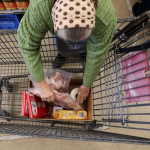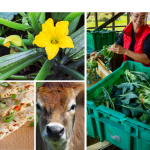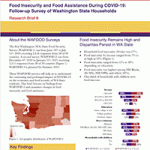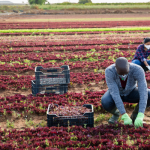NSP
June 27, 2021
For many King County families, food aid ‘not nearly enough’ as need spikes in pandemic

Food bank staff and public health officials predict it will take households several years to recover from food insecurity made worse by the economic instability of the pandemic. Ongoing research led by the UW Center for Public Health Nutrition in partnership with Washington State University and Tacoma Community College is highlighted.
June 14, 2021
UW Food Systems students tackle food security, food justice, and food sovereignty

University of Washington Food Systems, Nutrition, and Health majors once again collaborated with over a dozen regional partners in Seattle-King County during spring quarter 2021 to complete capstone projects that helped advance initiatives focused on increasing sustainability, resilience, and equity across the food system. This year’s projects, which centered on common themes of food security,…
June 2, 2021
Nutrition students honored with 2021 SPH Excellence Awards

Congratulations to Jane Karumba and Lauren Sawyer, Nutritional Sciences Program students who were honored with 2021 School of Public Health Excellence Awards, an annual recognition that spotlights exemplary faculty, staff and students. Winners were announced Wednesday, June 2. This year’s NSP recipients have demonstrated high academic achievement and have been inspirational among their peers, faculty…
Students recognized for 2021 leadership and service awards

Congratulations to Nutritional Sciences Program graduate students Dani Ladyka and Cairo Archer who have been selected for 2021 awards given to students exhibiting excellence in leadership and service. Dani Ladyka Recipient of the 2021 Carrie Cheney Student Leadership Award Dani Ladyka, an MS and RDN training student is the 2021 recipient of the Carrie Cheney…
May 24, 2021
Food Systems student presents at UW SPH Symposium

Melody Guo, a Food Systems, Nutrition & Health Major and Amber Li, a Public-Global Health Major will co-present at the upcoming UW School of Public Health Undergraduate Symposium to be held on May 27. Their session titled “Dietary supplement perception and usage pattern among the Chinese older population: A pilot study” will be presented at…
May 13, 2021
UW dietetics student and alumna recognized by WSAND

Congratulations to University of Washington current and past dietetics students who were honored this year with annual awards of excellence by the Washington State Academy of Dietetics and Nutrition (WSAND). Each year, WSAND honors individuals in the dietetics profession who have stood out among their peers, elevating the field of nutrition and dietetics, and exhibiting…
May 11, 2021
Reliance on food assistance programs on the rise in Washington State

Food insecurity remains high and disparities persist among Washington State households, while reliance on food assistance programs across the state have risen over the past six months, according to new data published by the University of Washington Center for Public Health Nutrition. The latest report from the WAFOOD research team compares data from two surveys,…
May 6, 2021
Autumn food course explores multisensory dining

Do you eat with your eyes? How does your brain decide what makes one food more appetizing than another? Register for NUTR 490, offered autumn 2021, to explore food from multiple perspectives, and go beyond taste, sight, and smell! In this advanced course, you will critically evaluate, through the study of research and practical applications,…
March 31, 2021
How farms and ranches in Washington have been impacted by COVID-19

Nearly 60% of farms and ranches in Washington State have been negatively impacted by COVID-19 in 2020, and expect to make changes to adapt their businesses in 2021, according to a new report published by the University of Washington Center for Public Health Nutrition in collaboration with Washington State University and the Washington State Department…
March 23, 2021
You waste more than $1,000 of food a year. Chew on that

Marie Spiker speaks with the Los Angeles Times about global food waste and new data published in the Food Waste Index for 2021 by the UN Environment Programme which assesses that the world wastes 1 billion tons of food each year.
Previous page Next page